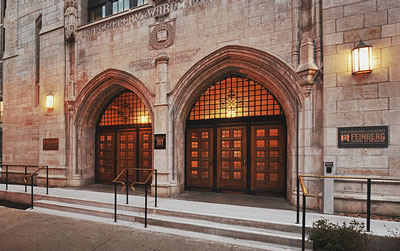Month: April 2023
-

Students Investigate the Value of Free and Charitable Health Clinics
In partnership with the Illinois and Wisconsin Associations of Free and Charitable Clinics, third-year medical students Raj Dalal, Melissa Bak and their peers have created a data tool that estimates the value free and charitable clinics provide to patients and the healthcare sector.
-

Understanding the Role of Octopamine in Neurodegeneration
Northwestern Medicine scientists have discovered how octopamine, the major “fight-or-flight” neurotransmitter in invertebrates, communicates with other cells to prevent cell death in mammalian brains, according to a study published in the Proceedings of the National Academy of Sciences.
-

MSTP Women’s Forum Hosts Reproductive Justice Panel
Feinberg’s Medical Scientist Training Program (MSTP) held its annual Women’s Forum, which included a reproductive justice panel featuring physician-scientists from across the Midwest.
-

Medical Student Receives Soros Fellowship for New Americans
Zhanlin Chen, a first-year medical student at Feinberg, has been awarded the 2023 Paul & Daisy Soros Fellowship for New Americans, a prestigious scholarship granted to immigrants or children of immigrants.
-

Feinberg Faculty Inducted into Prominent Medical Societies
Five Feinberg faculty members have been inducted into the American Society for Clinical Investigation (ASCI) and the Association of American Physicians (AAP), two of the oldest medical honor societies in the U.S.
-

Graphene ‘Tattoo’ Treats Cardiac Arrhythmia With Light
Scientists led by Northwestern University and the University of Texas at Austin (UT) have developed the first cardiac implant made from graphene, a two-dimensional super material with ultra-strong, lightweight and conductive properties, described in a study published in Advanced Materials.
-

Admitted Students Take a Second Look at Feinberg
On April 13 and 14, more than 200 prospective medical students visited Feinberg for a “Second Look” at the medical school. The two-day event allowed admitted students to get a feel for life at Feinberg by attending seminars, touring campus and meeting with current students and faculty.
-

Four Feinberg Faculty Elected to American Academy of Arts and Sciences
Four Feinberg faculty have been elected members of the American Academy of Arts and Sciences, one of the nation’s oldest and most prestigious honorary societies.
-

Medical Student Honored with Public Health Service Award
Precious Akanyirige, a fourth-year student in the MD/MPH degree program, has been awarded the 2023 Excellence in Public Health Award, given by the U.S. Public Health Service.
-

Uncovering the Causes of Neuron Dysfunction in Huntington’s Disease
Investigators led by D. James Surmeier, PhD, the Nathan Smith Davis Professor and chair of Neuroscience, have uncovered previously unknown neuronal circuits that contribute to brain dysfunction in Huntington’s disease.






